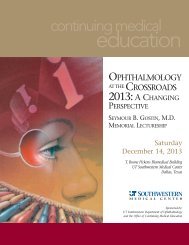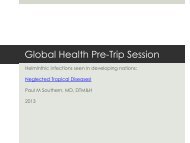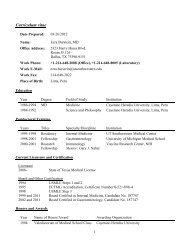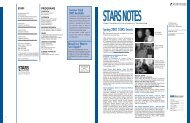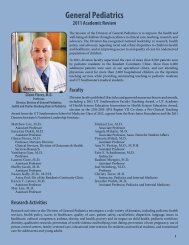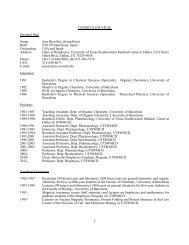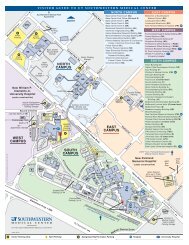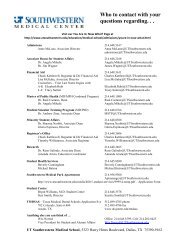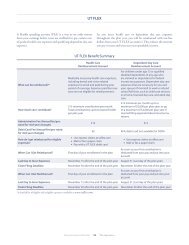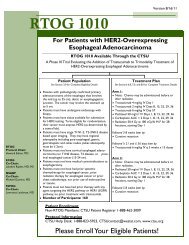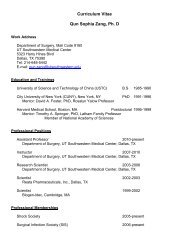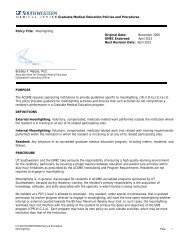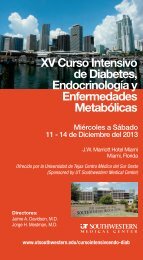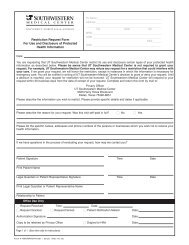Medical Student, Resident & Fellow Education - UT Southwestern
Medical Student, Resident & Fellow Education - UT Southwestern
Medical Student, Resident & Fellow Education - UT Southwestern
You also want an ePaper? Increase the reach of your titles
YUMPU automatically turns print PDFs into web optimized ePapers that Google loves.
<strong>Medical</strong> <strong>Student</strong> <strong>Education</strong><br />
As one of four medical schools in the University of Texas system, <strong>UT</strong> <strong>Southwestern</strong> accepts approximately 230-240 students<br />
annually. The education of these students remains one of the core missions of the Department of Pediatrics. A solid foundation<br />
in childhood health and illness has long been recognized as one of the central components of a well-rounded medical<br />
education, and the Department of Pediatrics strives to offer students the opportunity to explore the full breadth of pediatric<br />
medical care through their many programs.<br />
At the center of these offerings is the core clerkship in Pediatrics for third-year medical students at <strong>UT</strong> <strong>Southwestern</strong>. This<br />
required element of the medical curriculum consists of an eight-week rotation through the many care units housed at<br />
Children’s <strong>Medical</strong> Center, in addition to select locations at Parkland Health & Hospital System and, uniquely, through the<br />
offices of select community pediatricians from around the North Texas area who volunteer to participate in student education<br />
by hosting medical students in their offices. During this eight-week rotation, students spend four weeks on the inpatient<br />
service units at Children’s and another four weeks in various ambulatory settings. The inpatient experience is aligned to<br />
maximize student participation in all aspects of patient care: students spend two weeks of their time on an inpatient medicine<br />
ward and two weeks on one of the hospital’s subspecialty wards. The outpatient experience provides trainees a one-week<br />
exposure to neonatal care at the newborn nursery in Parkland, two weeks of ambulatory experience focused in the <strong>Medical</strong><br />
<strong>Student</strong> Clinic, and the aforementioned opportunity to spend a week at the office of a private general pediatrician in the<br />
Dallas community. This latter week provides students a unique perspective into the provision of care outside of a traditional<br />
academic teaching environment.<br />
In the <strong>Medical</strong> <strong>Student</strong> Clinic (MSC), third-year students work directly with attending physicians from the faculty of the<br />
Department and with local pediatricians who volunteer their time. Knowing that patients who present to MSC will only be<br />
seen by them and their attending physician provides students a higher level of responsibility than in many other aspects of<br />
their 3 rd year of training. During these two weeks, students also rotate through many of the subspecialty care clinics located<br />
throughout the hospital to gain exposure to the full breadth of specialized care provided by staff physicians.<br />
A full curriculum based on the core competencies as published by the Council on <strong>Medical</strong> <strong>Student</strong> <strong>Education</strong> in Pediatrics<br />
(COMSEP) is taught through bedside clinical supervision and daily rounds, in addition to various didactic sessions and<br />
interactive case-based discussions facilitated by faculty in nearly all divisions in the Department. <strong>Student</strong>s also participate<br />
in community advocacy through their involvement in nutrition education programs for elementary school students in the<br />
Dallas Independent School District. The entire curriculum is reviewed on an ongoing basis based on feedback from medical<br />
school faculty, national regulatory agencies and students themselves. The entire experience is facilitated through one central<br />
website which hosts all of the pertinent educational resources for the students rotating through Pediatrics. <strong>Student</strong>s rotating<br />
through the core clerkship continue to outpace national averages on standardized assessments. For the 2010-2011 academic<br />
year, <strong>UT</strong> <strong>Southwestern</strong> students scored four points above the national average for comparable pediatric clerkships on the<br />
National Board of <strong>Medical</strong> Examiners subject exam in Pediatrics. The overall performance of the students on the NBME<br />
exam was the highest it has been in seven years.<br />
Fourth-year medical students at <strong>UT</strong> <strong>Southwestern</strong> have more flexibility to tailor their academic schedule to meet individual<br />
learning goals. Whether students want to gain a more in-depth exposure to pediatric subspecialties in preparation for an<br />
eventual career in pediatrics or just to strengthen their foundation in caring for children in advance of another career path,<br />
the department offers numerous opportunities to fourth-year students through the facilities at Children’s and Parkland.<br />
<strong>Student</strong>s can immerse themselves in acute/intensive care experiences via rotations in the Neonatal Intensive Care Unit, the<br />
Pediatric Intensive Care Unit, Cardiovascular Intensive Care Unit and Pediatric Emergency Medicine.<br />
Extended experiences in any of a number of subspecialty clinics including Pediatric Hematology-Oncology, Nephrology,<br />
Gastroenterology, Endocrinology and others are available for fourth-year students as well. In addition, a total of 40 students<br />
from outside institutions came to <strong>UT</strong> <strong>Southwestern</strong> and Children’s <strong>Medical</strong> Center in the past to do visiting rotations in<br />
pediatrics. The department also offers, and continues to strive to increase the number of, international elective opportunities<br />
for our students and is in the process of developing programs to attract top students from international medical schools to<br />
do visiting rotations in Dallas this coming year.<br />
<strong>Medical</strong> students rated their experience on their Pediatrics Clerkship in 2010-2011 as overwhelmingly positive. <strong>Student</strong><br />
feedback from course evaluations has remained consistently positive, specifically as it relates to autonomy, promotion of<br />
clinical skills, and preparation for internship. On the 2011 graduation questionnaire, 87.8% of <strong>UT</strong> <strong>Southwestern</strong> students<br />
2<br />
rated their educational experience as “good” or “excellent,” continuing a trend of excellence in that measure for the past<br />
several years.<br />
Faculty from the Department of Pediatrics also participate, often in leadership roles, in the more didactic curriculum of the<br />
first two years of medical school, including such key courses as genetics, biochemistry and medical ethics. Beginning with<br />
the 2007-2008 academic year, faculty members in the department also served as mentors in the new colleges system at <strong>UT</strong><br />
<strong>Southwestern</strong>. Each college’s mentor leads a group of six medical students in both first- and second-year classes and deliver<br />
curricula such as professionalism and ethics, communication skills like taking patients’ histories, diagnostic and physical<br />
exam skills, and clinical reasoning and interpretation skills through weekly small group meetings. The first group of students<br />
to participate in the colleges program graduated this past year.<br />
The department takes great pride in the quality of teaching provided by the entire faculty. At the 2011 Excellence in <strong>Education</strong><br />
Annual Reception and Award ceremony, three faculty members in the department received teaching awards. These included<br />
Dr. James Amatruda, recognized for excellence for his role in the MS1 Preclinical curriculum, and Drs. Karthik Srinivasan<br />
and Vineeta Mittal, who received Pediatrics Core Clerkship Teaching Awards. Perhaps most telling, 41 students from the<br />
graduating medical school class of 2011 have chosen to pursue a career in pediatrics or some combined program including<br />
pediatrics.<br />
<strong>Resident</strong> <strong>Education</strong><br />
The <strong>UT</strong> <strong>Southwestern</strong> Pediatric Residency Program at Children’s <strong>Medical</strong> Center partners with the<br />
Department of Pediatrics faculty members to provide broad and deep educational experiences to our<br />
98 <strong>UT</strong> <strong>Southwestern</strong>/Children’s <strong>Medical</strong> Center pediatric house officers, as well as more than 200<br />
visiting trainees in anesthesia, emergency medicine, family medicine and psychiatry. Each division<br />
in the Pediatrics Department contributes substantially to the Residency Program in important<br />
ways, including educating residents during each rotation and through noon conference didactic<br />
presentations.<br />
<strong>Resident</strong>s go through 13 four-week rotations throughout the academic year. The rotations offer the<br />
residents their core education in pediatric medicine as practiced in the emergency room, pediatric ward<br />
medicine teams, newborn nursery, neonatal and pediatric intensive care units and subspeciality ward<br />
service teams. Additional training in subspecialty consult services and other individualized training<br />
are offered as electives. Learning clinic-based pediatrics with continuity of care and longitudinal<br />
follow up occurs throughout training.<br />
Pediatric Residency Program Team<br />
The program is led by Jeffrey McKinney, M.D., Ph.D., Program Director. He holds the Harry W.<br />
Bass, Jr. Professorship in Pediatric <strong>Education</strong>. Dr. McKinney works closely and collaboratively with<br />
the program’s two Associate Program Directors, Dorothy Sendelbach, M.D. and Lauren Gore, M.D.,<br />
and the Program Coordinator, Dawn Bayé, M.B.A. They offer unique and complimentary talents and<br />
insights that strengthen the program and the education of its residents.<br />
Dr. Natalie Pounds<br />
Dr. Jackie Powers<br />
Dr. David Sutcliffe<br />
Dr. Jeffrey McKinney<br />
Dr. Dorothy Sendelbach<br />
The 2011-2012 Chief <strong>Resident</strong>s<br />
were Natalie Pounds, Jackie Dr. Lauren Gore<br />
Powers and David Sutcliffe.<br />
Each chief is selected for academic and non-academic<br />
interests that will enhance the Residency Program.<br />
During their PL2 year, chiefs go through a selection<br />
process that allows for the Program to make a thoughtful<br />
and strategic chief selection. Chiefs are heavily involved<br />
in the day-to-day activities of the program and serve as<br />
a liaison among faculty members and residents.<br />
3



